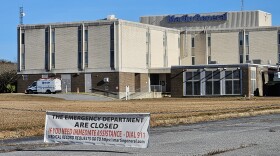North Carolina’s hospitals are quickly filling up with patients stricken by the coronavirus, even as health systems in some of the hardest-hit regions -- the Triad and greater Charlotte area -- take steps to make room for a wave of new patients.
The looming crisis is fueled by lack of clinical staff, not by lack of physical space for beds.
Health care workforce shortages have been chronic and persistent in some areas of the state, particularly rural ones. But with virtually every hospital in the state drawing on a finite pool of available providers, more than 4,000 North Carolina hospital beds are either unstaffed or were not reported to the state, data from the Department of Health and Human Services shows. COVID-19 infections in health care workers have also compounded the shortage.
Current staffing levels have meant that some hospital wards and ICUs across the state are approaching capacity, regional data shows. The 13-county region that includes Charlotte, the biggest city in North Carolina, for example, had just 963 available inpatient beds and 25 staffed intensive care beds as of Wednesday.
The Triad, a 20-county region with roughly 1.7 million residents, had a little more than 1,000 inpatient beds and 45 staffed ICU beds.
With coronavirus hospitalizations reaching new records almost daily, health care facilities across the state are likely to get even more crowded in the coming weeks, experts estimate.
Some systems, including Cone Health, Novant and Wake Forest Baptist have already limited the volume of routine surgeries and other procedures, joining at least 100 health care systems nationwide that did the same in December.
Some hospitals are already nearing capacity. The Guilford County-based Cone Health system is roughly 95 percent full, even though routine surgeries and other nonessential services have been delayed, said Jay Wyatt, medical director of the system’s flagship hospital, Moses Cone Hospital in Greensboro.
“We don’t see an end to this anytime soon,” he added. “It’s probably going to be this way for at least a couple of months.”
Health systems across the state, including Cone, Iredell Health System and New Hanover Regional Medical Center, have also tried to control the influx of coronavirus patients through remote monitoring for patients who need medical monitoring but aren’t sick enough to be in the hospital.
“Hospitals are under a lot of strain,” said Tatyana Kelly, vice president of planning, strategy and member services at the North Carolina Healthcare Association, an organization with roughly 130 member hospitals. “It’s not just the increase in cases, it’s also a lack of staff availability.”
Systems across the state have managed to care for patients thus far despite these limitations, Kelly said, but that may change if the infection rate increases.
“We are not in a crisis state but we are definitely not in a good place,” she added. “Hospitals from one end of the state to the other are struggling.”
Staff are not immune, yet
Since the middle of December, just over 109,000 health care workers have received their first coronavirus vaccine doses. None have gotten the second dose, which is typically given 21 to 28 days after the first dose, according to data from the state. North Carolina’s health care workforce has roughly 267,000 people, according to the Bureau of Labor Statistics, meaning that more than half have not yet received their first dose of the vaccine.
Kelly, of the North Carolina Healthcare Association, said vaccination efforts are slow not only because a limited number of doses is available, but also because the task of mounting a mass vaccination campaign also falls on the strained health care workforce.
Ultimately, vaccinating health care staff would help systems with vacancies due to illness, she added, but that effort will take time. In the meantime, cases are mounting and hospitalizations continue to rise.
“I think the next month is going to be hard if not the hardest of the pandemic,” she said.
Staff, not space, a limit
As coronavirus blew through communities last spring, the state turned a shuttered hospital building in Richmond County to a field hospital with enough space for up to 70 beds. But hospitals across the state managed the spring surge, and the state closed the facility.
State health department spokeswoman Amy Ellis said on Wednesday the hospital will remain closed, mainly because it would do nothing to alleviate the staffing shortages that have limited hospital capacity.
“A field hospital or alternate care site would require trained medical staff to operate,” she wrote in an email. “At this time any trained medical staff who are available are encouraged to support within the hospitals where there are physical beds available but limited staff.”
Wyatt, the medical director of Moses Cone Hospital, said a field hospital would only alleviate the pressure on hospitals if outside staff or even the military operated it. Otherwise, he said, a field hospital would only strain North Carolina’s existing medical staff pool.
The Charlotte-based systems Novant and Atrium also had plans to open a field hospital in the county, but they later benched these plans in favor of virtual monitoring programs that would keep coronavirus patients in the community.
Novant spokeswoman Kristen Barnhardt said this week the health care system has been able to meet patient demands thus far.
“With the capacity to add beds comes the need for additional clinical care teams to support them,” she wrote in an email. “We continue to monitor the data closely and stand ready to activate additional surge planning scenarios from staffing contingency to the utilization of additional space on our campuses, should we need to.”
Surge capacity to go
One region in the state, however, does have an operational field hospital as of this week. Samaritan’s Purse, a Boone-based disaster response organization, erected a 30-bed hospital in the parking lot of Lenoir’s Caldwell UNC Health Care. Samaritan’s Purse has responded to the coronavirus crisis by setting up temporary hospitals in Italy and New York City earlier in the pandemic.
Erin Holzhauer, medical director of the unit in Lenoir, said roughly 45 staff members -- all contractors, and some from out of state -- will operate the 10-tent coronavirus unit for at least a few weeks, and maybe longer.
“We’re pretty flexible,” she said. “We’ll monitor the trends and we’ll monitor the hospitals in the region to see their case counts and how full they are and if they’re still being overwhelmed by COVID-19 patients, our length [of stay] will be determined by that.”
The unit isn’t a hospital in itself, patients come to the unit through transfers from five area hospitals: Caldwell, Appalachian Regional Healthcare System, Catawba Valley Health System, Carolinas HealthCare System Blue Ridge, and Frye Regional Medical Center.
“We’re hoping that by having 30 beds here, we will have relieved enough pressure that local hospitals will not be entirely full,” Holzhauer said.
As staff readied the hospital for patients this week, Holzhauer said Samaritan's Purse has no immediate plans for other field hospitals elsewhere in the state.
“There have been requests for other locations,” she said. “At this time, there are no confirmed locations.”
This article first appeared on North Carolina Health News and is republished here under a Creative Commons license.









